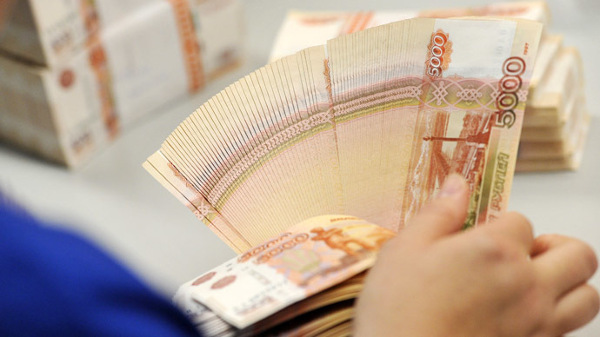Ruble’s devaluation makes Astana to restore customs posts

By Sara Rajabova
Dramatic changes in Russian economy resulted from the severe political and economic western sanctions imposed on the country have considerably impacted the Russian-related economies.
Hard economic situation in Russia because of sanctions over Ukrainian turmoil has significantly affected Kazakhstan’s economy, as the dramatic fall in Russian ruble made it difficult for the Kazakh producers to compete with cheap Russian goods.
At the end of 2014, the Russian ruble began its dramatic fall exacerbated by low oil prices. The devaluation is at around 80 percent compared to the dollar-ruble exchange rate of mid-2014 and Russian currency’s rate to dollar and euro continues falling.
High margin in the exchange rates in Kazakhstan and Russia caused a substantial difference in prices of similar goods in the two post Soviet countries. Kazakh citizens change exchange rate of tenge to rubles and go for shopping tours to Russia, where the goods are much cheaper than in Kazakhstan due to ruble devaluation.
It is important to note that Kazakh national currency tenge is also in trouble. Some experts are afraid of a new devaluation. Speculation over devaluation has intensified as the Kazakh economy slowed due to the dramatic fall in oil prices and the negative spillover from the troubles in Russia, Kazakhstan’s largest trading partner.
The tenge’s relative strength against the plunging ruble hurts Kazakh exporters.
Such a situation possesses serious threat to Kazakhstan’s domestic market, as the domestic industrial enterprises are experiencing serious problems because the Kazakh market has been flooded with cheap Russian products.
Therefore, some in Kazakhstan have suggested temporarily banning or restricting import of some goods from Russia to the country.
Pavlodar authorities have addressed the First Vice-Prime-Minister of Kazakhstan Bakhytzhan Sagintayev with a proposal to temporarily banning imports from Russia, Kazakh Tengrinews reported.
Duisenbai Turganov, Vice-Governor of Pavlodar Oblast said prices of Russian competitors are 30-60 percent lower than what Kazakhstani suppliers can offer, which negatively affects the activities of the local industrial enterprises. He added that they offer to introduce a ban or limit the import from Russia for those goods that domestic producers are capable of supplying in sufficient quantities on their own.
Kazakh Vice-Primer Sagintayev replied that the Kazakh government was looking for solutions and planning to coordinate its actions with the Russian government, Kazakh media reported.
However, Russian TASS agency quoted him as saying on February 6 that Astana has no plan to impose restrictions on imports from Moscow.
Earlier, Russian newspaper "Kommersant" reported with a reference to its sources in Russian Agriculture Ministry that Kazakhstan may ban or restrict import of some goods from Russia. However, neither the Russian nor Kazakh officials have confirmed the report.
On the other hand, Andrey Slepnev, Minister of Trade of the Eurasian Economic Commission said the issue of restrictions of imports of Russian goods to Kazakhstan can be discussed at a bilateral meeting of Russian and Kazakh officials.
In the meantime, a number of Kazakh entrepreneurs and economy experts proposed to restore customs posts between Kazakhstan and Russia.
The customs border was removed when Russia, Kazakhstan and Belarus formed an economic alliance - the Customs Union - in 2010, which was a first step in forming Eurasian Economic Union. On January 1, 2015 the treaty between the presidents of Russia, Kazakhstan and Belarus authorizing the Eurasian Economic Union went into effect.
Olzhas Khudaibergenov, Director of the Center for Macroeconomic Research told Tengrinews that suggested reintroducing customs checkpoints and customs duties together with them to protect the domestic market instead.
He said the instability of the ruble is likely to persist for at least another two years, so it makes sense to restore the customs checkpoints on the borders with Russia and Kyrgyzstan. Kazakh-Kyrgyz border is 1113 km long and needs customs checkpoints to prevent Russian goods from being re-exported to Kazakhstan via Kyrgyzstan.
However, Khudaibergenov noted that restoring of the customs checkpoints would not mean a disintegration of the Eurasian Economic Union, as current situation is an exceptional case that leaves no other way.
The Treaty of the Eurasian Economic Union allows Kazakhstan to set up customs posts in several cases. Member states have the right to impose restrictions on the mutual trade in goods if such restrictions are necessary for protecting the human life and health, public morality, law and order and environment, ensuring the country’s defense and security of the member states and etc.
--
Sara Rajabova is AzerNews’ staff journalist, follow her on Twitter: @SaraRajabova
Follow us on Twitter @AzerNewsAz
Here we are to serve you with news right now. It does not cost much, but worth your attention.
Choose to support open, independent, quality journalism and subscribe on a monthly basis.
By subscribing to our online newspaper, you can have full digital access to all news, analysis, and much more.
You can also follow AzerNEWS on Twitter @AzerNewsAz or Facebook @AzerNewsNewspaper
Thank you!
